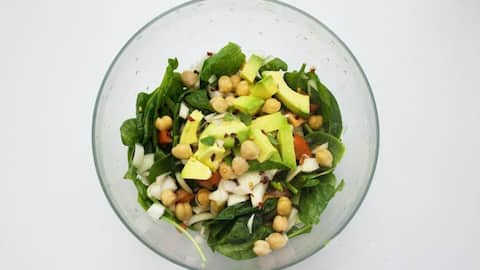Here's why you should eat salads often
What's the story
Salads are a healthy, uncomplicated, and refreshing combination of crisp, colorful, and abundant fruits and vegetables. Salads are not merely a side dish; they are a powerhouse of nutrients that contribute to enhanced physical health, improved mental well-being, and a more robust immune system. Let's delve into the numerous benefits that come with incorporating salads into your daily diet.
Benefit 1
Helps in weight management
Incorporating salads into your meals can be a strategic move for those aiming to manage their weight. In addition to promoting fullness, a well-balanced salad with a high bulk content and low-calorie count can aid in weight loss and weight management. Given that it provides all the nutrients you need without adding extra calories, it helps people get thinner but more toned.
Benefit 2
You consume enough fruits and vegetables
Eating adequate fruits and vegetables to maintain a healthy diet might be difficult for some people. Salads are a treasure trove of essential vitamins, minerals, and antioxidants. Thus, eating a fresh bowl of salad every day will help you easily meet your recommended daily intake of nutrients. However, try to consume most of the ingredients in their unprocessed state for maximum benefit.
Benefit 3
Increase immunity
The combination of vitamins, minerals, and antioxidants in salads works synergistically to strengthen the immune system. Nutrients like vitamin C, found in abundance in vegetables like bell peppers and broccoli, play a crucial role in supporting the body's defense against infections and illnesses. Taking in vitamin C can help avoid infections because it is necessary for immune system maintenance.
Benefit 4
Improves hydration
Salad ingredients rich in water content play a crucial role in hydration. Maintaining proper hydration is vital for temperature control, nutrient transport, and cellular health. Include hydrating options like cucumber, oranges, watermelon, and lettuce in your salads. These fruits and vegetables replenish lost fluids throughout the day. Incorporating these hydrating elements into your salads offers a delightful method to boost daily fluid intake.
Benefit 5
Provides enough fiber
Salads made with high-fiber components, such as quinoa, lentils, and chickpeas, help you feel satisfied for longer. This aids in weight management, blood sugar regulation, and gut health promotion—all of which are critical for good digestion and nutritional absorption. Vegetables like cucumbers and celery, commonly found in salads, have high water content, contributing to overall hydration and smooth digestion.
